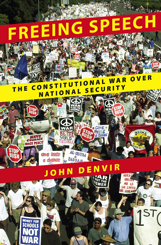A structure for comparative analysis of Freedom of Expression
 Prof Adrienne Stone (pictured left), Director of Centre for Comparative Constitutional Studies in the Melbourne Law School has just made a very interesting article available on SSRN. It is The Comparative Constitutional Law of Freedom of Expression, forthcming as a chapter is in Rosalind Dixon and Tom Ginsburg (eds) Research Handbook in Comparative Constitutional Law (Edward Elgar, forthcoming, 2011). Stone argues:
Prof Adrienne Stone (pictured left), Director of Centre for Comparative Constitutional Studies in the Melbourne Law School has just made a very interesting article available on SSRN. It is The Comparative Constitutional Law of Freedom of Expression, forthcming as a chapter is in Rosalind Dixon and Tom Ginsburg (eds) Research Handbook in Comparative Constitutional Law (Edward Elgar, forthcoming, 2011). Stone argues:
…Freedom of expression is among the most widely protected of constitutional rights. Rights of freedom of expression can be found in constitutions drawn from all continents. … Even in those few democracies without comprehensive constitutional protection of rights, freedom of expression finds constitutional protection in other ways. It can plausibly be argued that parliamentary systems … – even in the era before the adoption of charters of rights – recognized a constitutional principle of freedom of expression that, though not enforceable by judicial review, was understood as a fundamental value that informed the reading of statutes and the common law. In addition, there are some legal systems that recognize a judicially enforceable principle of freedom of expression despite the absence of a written constitutional right.
… some scholars … question whether … the comparing free speech principles across constitutional systems is practical or useful for courts interpreting or applying constitutional principles of freedom of expression … The complexity of (and disagreement about) underlying philosophical commitments, the opacity of judicial decision making, and cultural specificity of any particular body of law, … [are] formidable problems for the comparativists, … and the] case for comparativism may be weaker in relation to constitutional principles have developed their own rich set of resources and a distinctive conception of freedom of expression.



 I’m sorry not to have been able to acknowledge the celebration of
I’m sorry not to have been able to acknowledge the celebration of 
 An extraordinarily important book is published today. It is Freeing Speech: the Constitutional War Over National Security (
An extraordinarily important book is published today. It is Freeing Speech: the Constitutional War Over National Security (